Factors, Theories and Wellbeing: A Report on Caring for Older People
VerifiedAdded on 2020/04/21
|6
|1047
|144
Report
AI Summary
This report delves into the multifaceted aspects of caring for older people, commencing with an exploration of prominent ageing theories. It examines both the activity theory, which emphasizes the importance of remaining active in old age, and the disengagement theory, which posits a natural withdrawal from society. The report then proceeds to identify various factors influencing the ageing process, including environmental and genetic elements, such as lifestyle choices, stress, and health conditions. Finally, it addresses the crucial role of healthcare professionals, including general practitioners and nurses, in supporting the independence and well-being of older adults. The report highlights the significance of empathetic and transparent care, emphasizing the importance of empowering service users through autonomy and effective medication management.
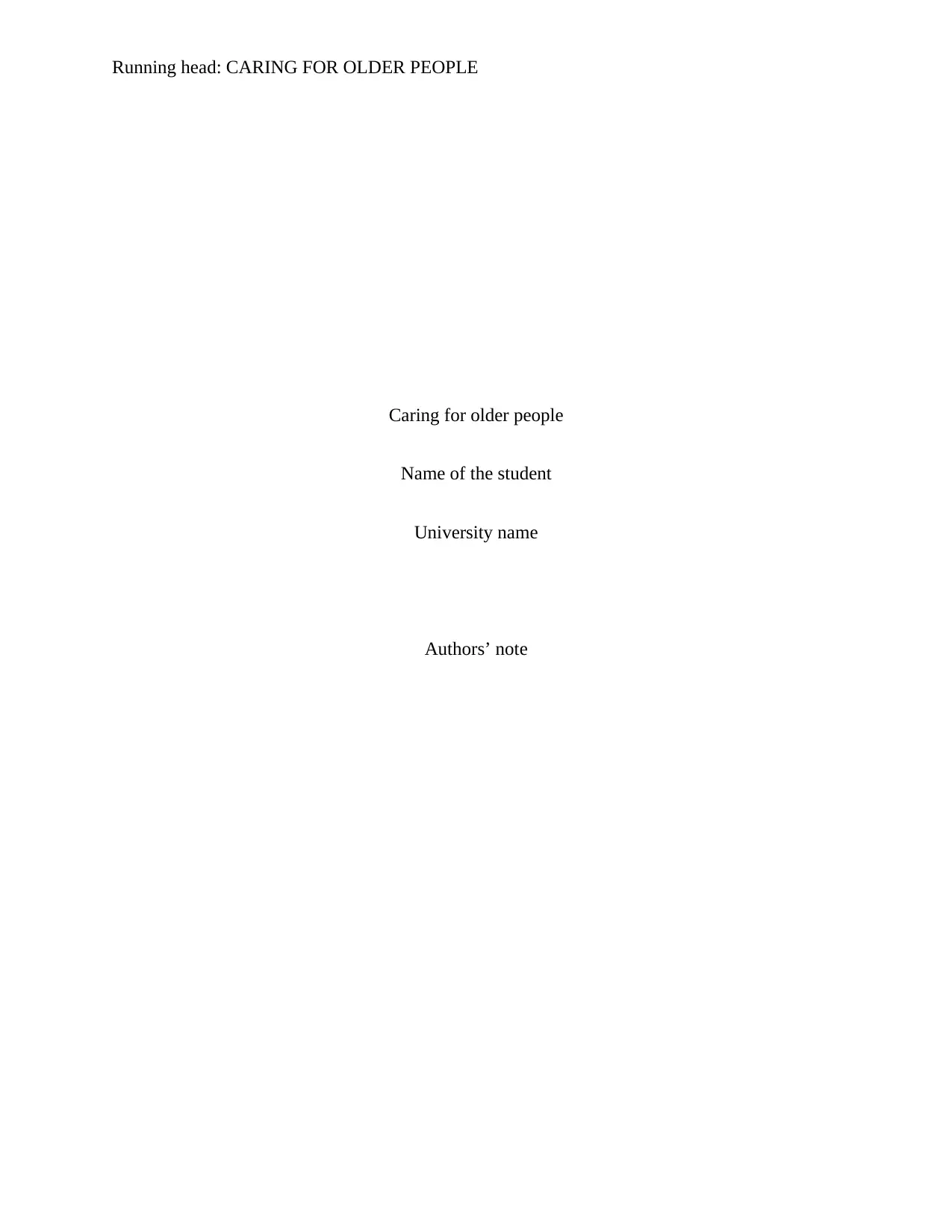
Running head: CARING FOR OLDER PEOPLE
Caring for older people
Name of the student
University name
Authors’ note
Caring for older people
Name of the student
University name
Authors’ note
Paraphrase This Document
Need a fresh take? Get an instant paraphrase of this document with our AI Paraphraser
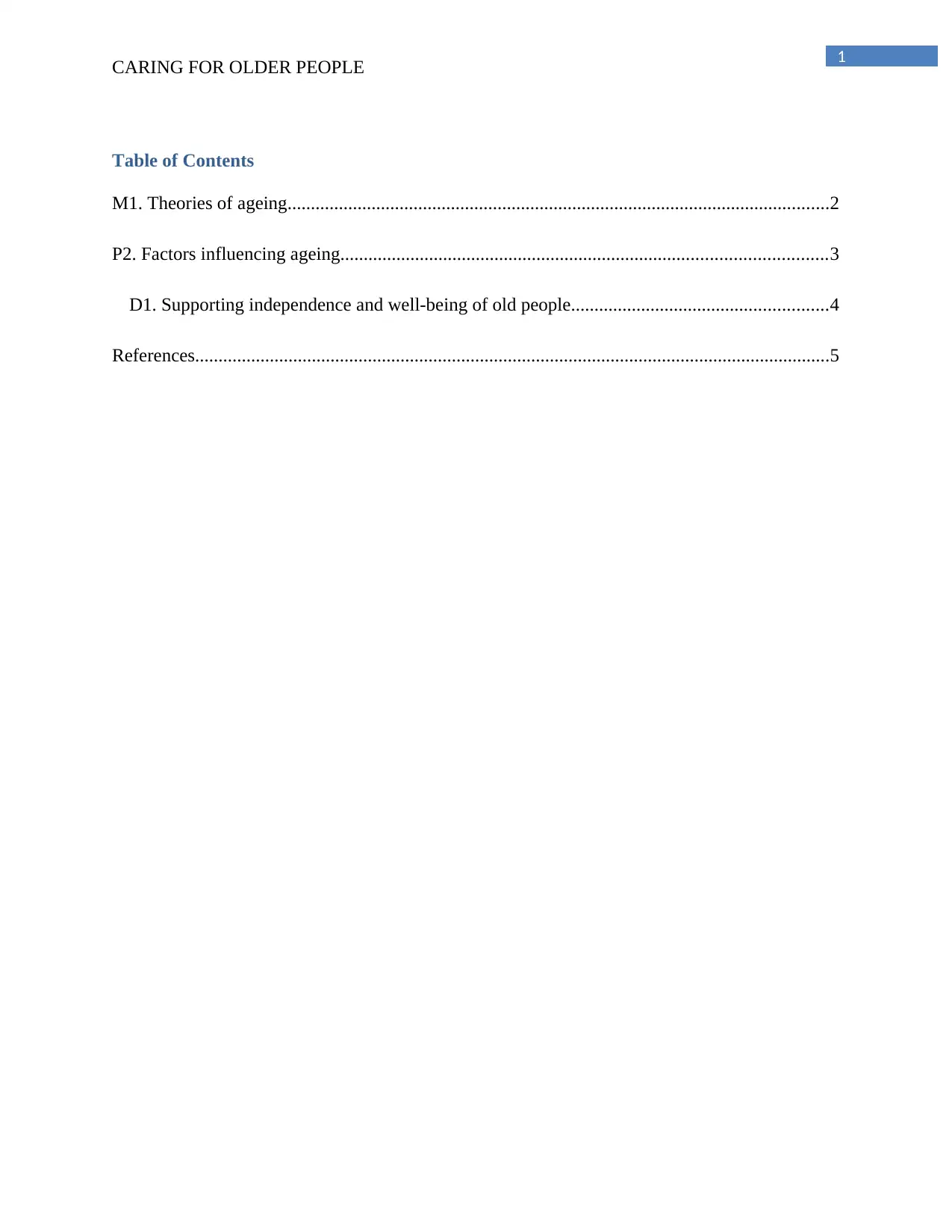
1
CARING FOR OLDER PEOPLE
Table of Contents
M1. Theories of ageing....................................................................................................................2
P2. Factors influencing ageing........................................................................................................3
D1. Supporting independence and well-being of old people.......................................................4
References........................................................................................................................................5
CARING FOR OLDER PEOPLE
Table of Contents
M1. Theories of ageing....................................................................................................................2
P2. Factors influencing ageing........................................................................................................3
D1. Supporting independence and well-being of old people.......................................................4
References........................................................................................................................................5
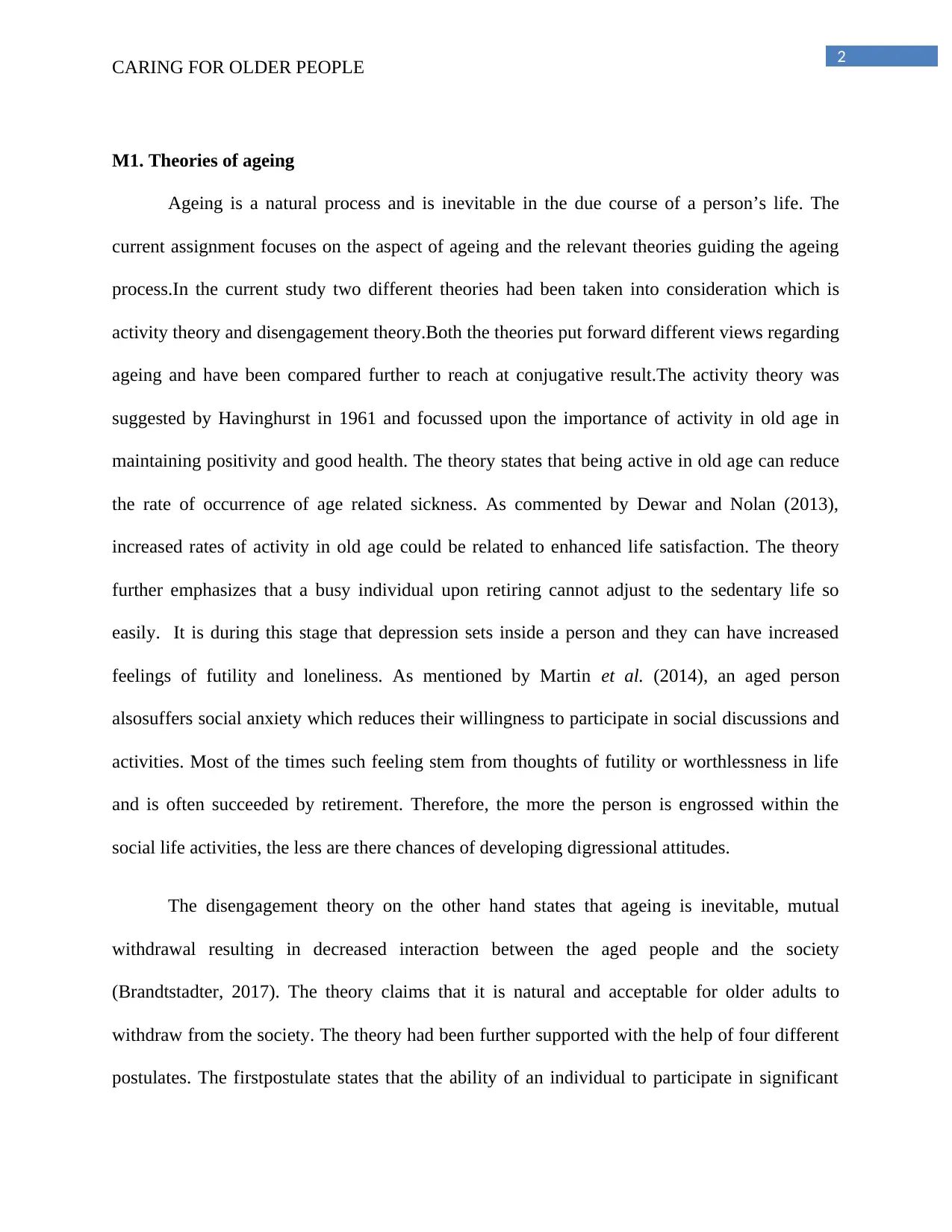
2
CARING FOR OLDER PEOPLE
M1. Theories of ageing
Ageing is a natural process and is inevitable in the due course of a person’s life. The
current assignment focuses on the aspect of ageing and the relevant theories guiding the ageing
process.In the current study two different theories had been taken into consideration which is
activity theory and disengagement theory.Both the theories put forward different views regarding
ageing and have been compared further to reach at conjugative result.The activity theory was
suggested by Havinghurst in 1961 and focussed upon the importance of activity in old age in
maintaining positivity and good health. The theory states that being active in old age can reduce
the rate of occurrence of age related sickness. As commented by Dewar and Nolan (2013),
increased rates of activity in old age could be related to enhanced life satisfaction. The theory
further emphasizes that a busy individual upon retiring cannot adjust to the sedentary life so
easily. It is during this stage that depression sets inside a person and they can have increased
feelings of futility and loneliness. As mentioned by Martin et al. (2014), an aged person
alsosuffers social anxiety which reduces their willingness to participate in social discussions and
activities. Most of the times such feeling stem from thoughts of futility or worthlessness in life
and is often succeeded by retirement. Therefore, the more the person is engrossed within the
social life activities, the less are there chances of developing digressional attitudes.
The disengagement theory on the other hand states that ageing is inevitable, mutual
withdrawal resulting in decreased interaction between the aged people and the society
(Brandtstadter, 2017). The theory claims that it is natural and acceptable for older adults to
withdraw from the society. The theory had been further supported with the help of four different
postulates. The firstpostulate states that the ability of an individual to participate in significant
CARING FOR OLDER PEOPLE
M1. Theories of ageing
Ageing is a natural process and is inevitable in the due course of a person’s life. The
current assignment focuses on the aspect of ageing and the relevant theories guiding the ageing
process.In the current study two different theories had been taken into consideration which is
activity theory and disengagement theory.Both the theories put forward different views regarding
ageing and have been compared further to reach at conjugative result.The activity theory was
suggested by Havinghurst in 1961 and focussed upon the importance of activity in old age in
maintaining positivity and good health. The theory states that being active in old age can reduce
the rate of occurrence of age related sickness. As commented by Dewar and Nolan (2013),
increased rates of activity in old age could be related to enhanced life satisfaction. The theory
further emphasizes that a busy individual upon retiring cannot adjust to the sedentary life so
easily. It is during this stage that depression sets inside a person and they can have increased
feelings of futility and loneliness. As mentioned by Martin et al. (2014), an aged person
alsosuffers social anxiety which reduces their willingness to participate in social discussions and
activities. Most of the times such feeling stem from thoughts of futility or worthlessness in life
and is often succeeded by retirement. Therefore, the more the person is engrossed within the
social life activities, the less are there chances of developing digressional attitudes.
The disengagement theory on the other hand states that ageing is inevitable, mutual
withdrawal resulting in decreased interaction between the aged people and the society
(Brandtstadter, 2017). The theory claims that it is natural and acceptable for older adults to
withdraw from the society. The theory had been further supported with the help of four different
postulates. The firstpostulate states that the ability of an individual to participate in significant
⊘ This is a preview!⊘
Do you want full access?
Subscribe today to unlock all pages.

Trusted by 1+ million students worldwide
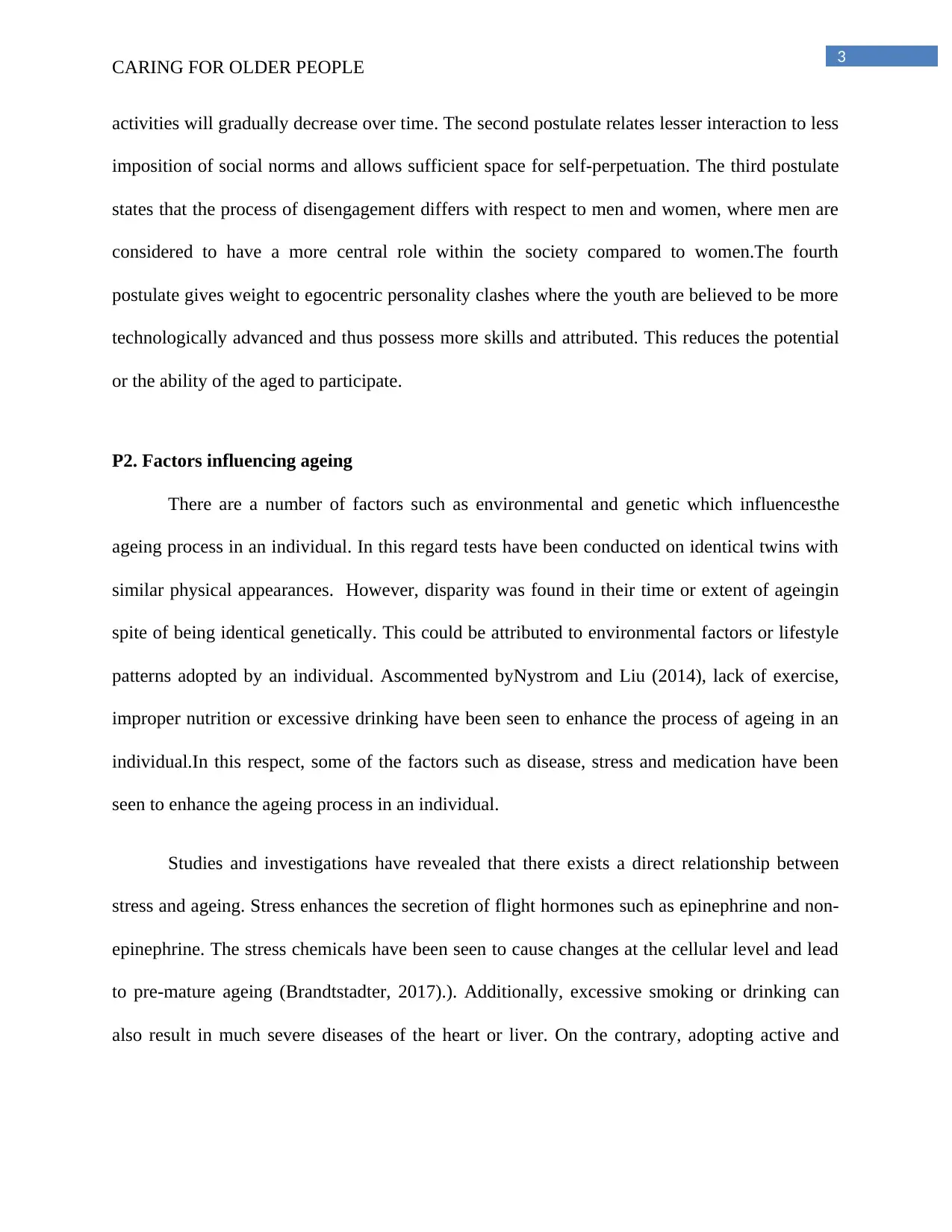
3
CARING FOR OLDER PEOPLE
activities will gradually decrease over time. The second postulate relates lesser interaction to less
imposition of social norms and allows sufficient space for self-perpetuation. The third postulate
states that the process of disengagement differs with respect to men and women, where men are
considered to have a more central role within the society compared to women.The fourth
postulate gives weight to egocentric personality clashes where the youth are believed to be more
technologically advanced and thus possess more skills and attributed. This reduces the potential
or the ability of the aged to participate.
P2. Factors influencing ageing
There are a number of factors such as environmental and genetic which influencesthe
ageing process in an individual. In this regard tests have been conducted on identical twins with
similar physical appearances. However, disparity was found in their time or extent of ageingin
spite of being identical genetically. This could be attributed to environmental factors or lifestyle
patterns adopted by an individual. Ascommented byNystrom and Liu (2014), lack of exercise,
improper nutrition or excessive drinking have been seen to enhance the process of ageing in an
individual.In this respect, some of the factors such as disease, stress and medication have been
seen to enhance the ageing process in an individual.
Studies and investigations have revealed that there exists a direct relationship between
stress and ageing. Stress enhances the secretion of flight hormones such as epinephrine and non-
epinephrine. The stress chemicals have been seen to cause changes at the cellular level and lead
to pre-mature ageing (Brandtstadter, 2017).). Additionally, excessive smoking or drinking can
also result in much severe diseases of the heart or liver. On the contrary, adopting active and
CARING FOR OLDER PEOPLE
activities will gradually decrease over time. The second postulate relates lesser interaction to less
imposition of social norms and allows sufficient space for self-perpetuation. The third postulate
states that the process of disengagement differs with respect to men and women, where men are
considered to have a more central role within the society compared to women.The fourth
postulate gives weight to egocentric personality clashes where the youth are believed to be more
technologically advanced and thus possess more skills and attributed. This reduces the potential
or the ability of the aged to participate.
P2. Factors influencing ageing
There are a number of factors such as environmental and genetic which influencesthe
ageing process in an individual. In this regard tests have been conducted on identical twins with
similar physical appearances. However, disparity was found in their time or extent of ageingin
spite of being identical genetically. This could be attributed to environmental factors or lifestyle
patterns adopted by an individual. Ascommented byNystrom and Liu (2014), lack of exercise,
improper nutrition or excessive drinking have been seen to enhance the process of ageing in an
individual.In this respect, some of the factors such as disease, stress and medication have been
seen to enhance the ageing process in an individual.
Studies and investigations have revealed that there exists a direct relationship between
stress and ageing. Stress enhances the secretion of flight hormones such as epinephrine and non-
epinephrine. The stress chemicals have been seen to cause changes at the cellular level and lead
to pre-mature ageing (Brandtstadter, 2017).). Additionally, excessive smoking or drinking can
also result in much severe diseases of the heart or liver. On the contrary, adopting active and
Paraphrase This Document
Need a fresh take? Get an instant paraphrase of this document with our AI Paraphraser
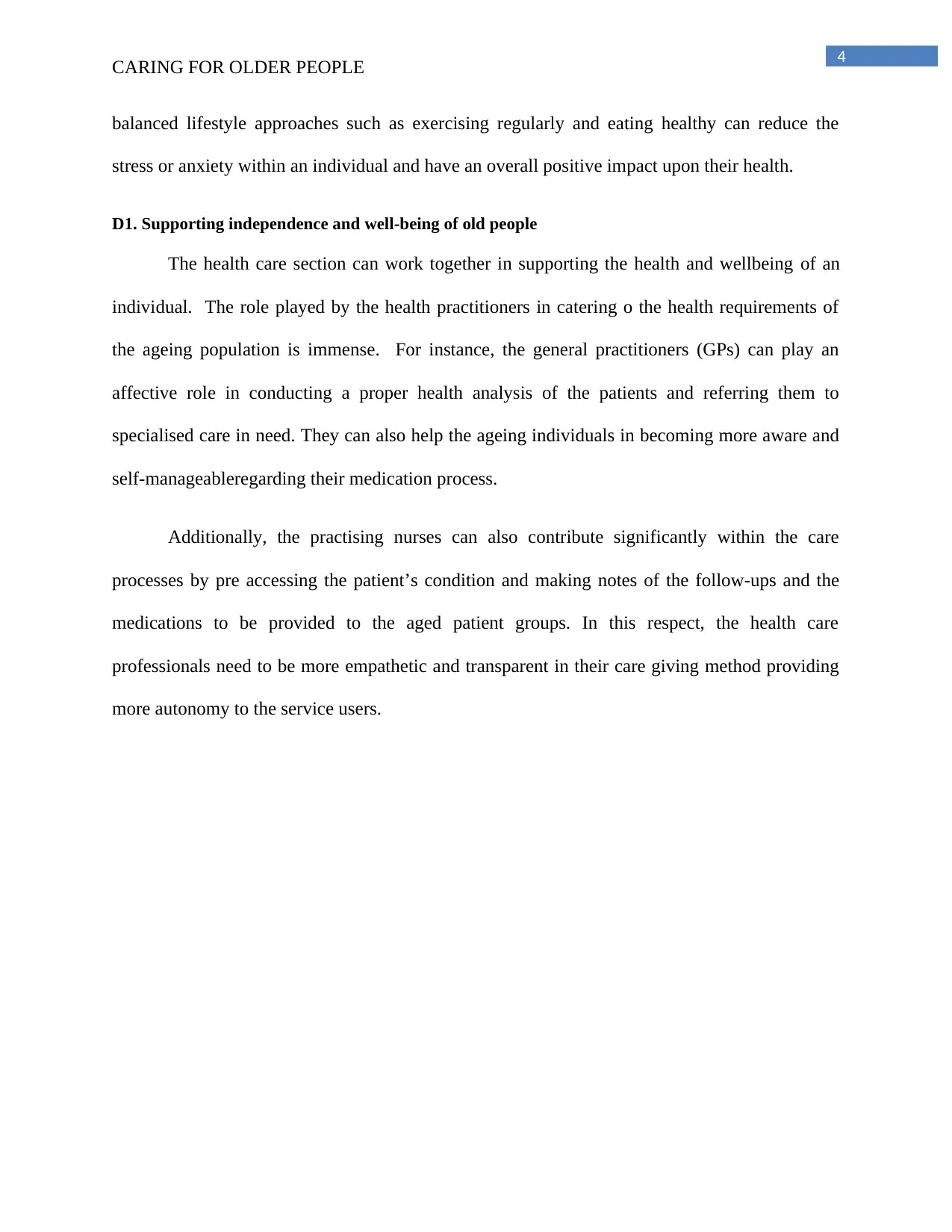
4
CARING FOR OLDER PEOPLE
balanced lifestyle approaches such as exercising regularly and eating healthy can reduce the
stress or anxiety within an individual and have an overall positive impact upon their health.
D1. Supporting independence and well-being of old people
The health care section can work together in supporting the health and wellbeing of an
individual. The role played by the health practitioners in catering o the health requirements of
the ageing population is immense. For instance, the general practitioners (GPs) can play an
affective role in conducting a proper health analysis of the patients and referring them to
specialised care in need. They can also help the ageing individuals in becoming more aware and
self-manageableregarding their medication process.
Additionally, the practising nurses can also contribute significantly within the care
processes by pre accessing the patient’s condition and making notes of the follow-ups and the
medications to be provided to the aged patient groups. In this respect, the health care
professionals need to be more empathetic and transparent in their care giving method providing
more autonomy to the service users.
CARING FOR OLDER PEOPLE
balanced lifestyle approaches such as exercising regularly and eating healthy can reduce the
stress or anxiety within an individual and have an overall positive impact upon their health.
D1. Supporting independence and well-being of old people
The health care section can work together in supporting the health and wellbeing of an
individual. The role played by the health practitioners in catering o the health requirements of
the ageing population is immense. For instance, the general practitioners (GPs) can play an
affective role in conducting a proper health analysis of the patients and referring them to
specialised care in need. They can also help the ageing individuals in becoming more aware and
self-manageableregarding their medication process.
Additionally, the practising nurses can also contribute significantly within the care
processes by pre accessing the patient’s condition and making notes of the follow-ups and the
medications to be provided to the aged patient groups. In this respect, the health care
professionals need to be more empathetic and transparent in their care giving method providing
more autonomy to the service users.
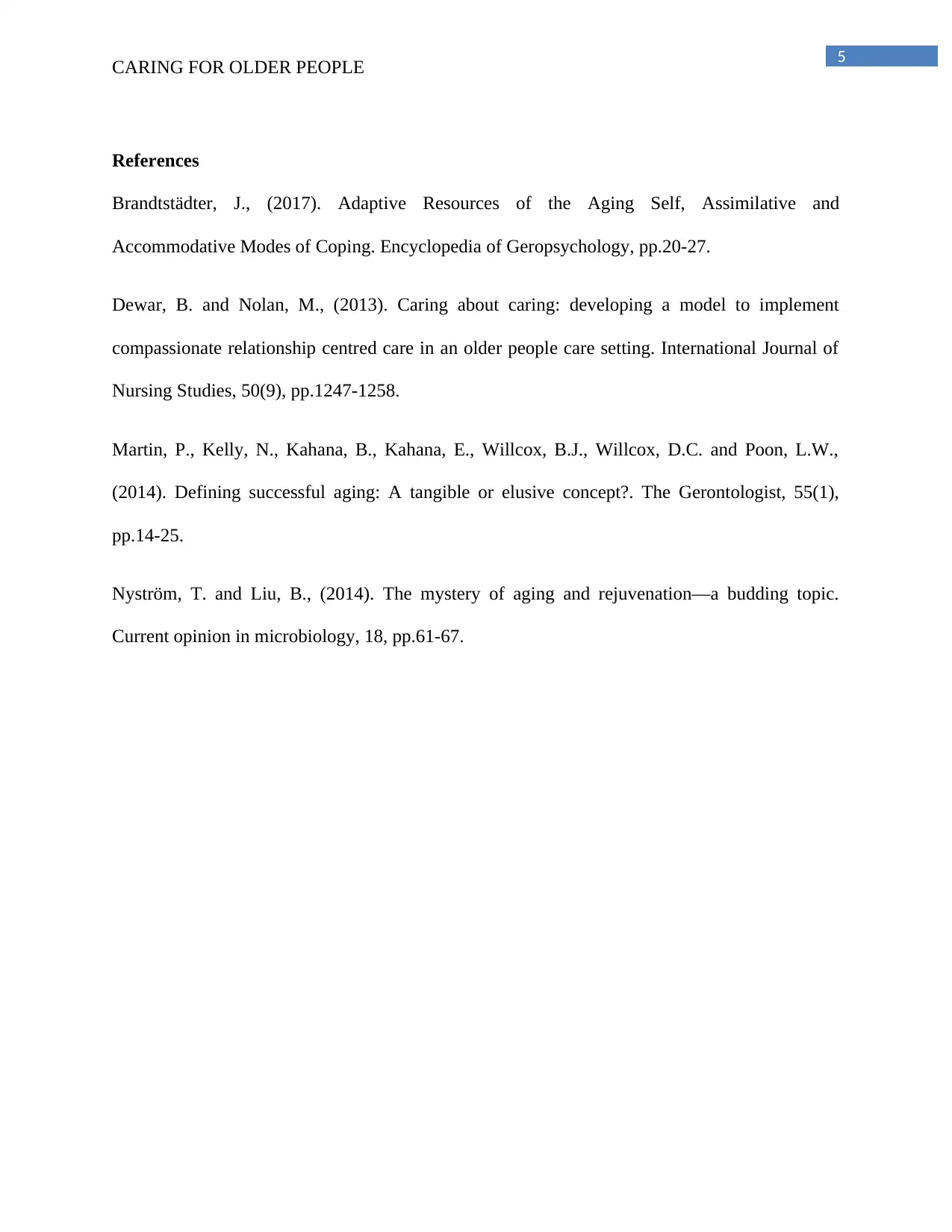
5
CARING FOR OLDER PEOPLE
References
Brandtstädter, J., (2017). Adaptive Resources of the Aging Self, Assimilative and
Accommodative Modes of Coping. Encyclopedia of Geropsychology, pp.20-27.
Dewar, B. and Nolan, M., (2013). Caring about caring: developing a model to implement
compassionate relationship centred care in an older people care setting. International Journal of
Nursing Studies, 50(9), pp.1247-1258.
Martin, P., Kelly, N., Kahana, B., Kahana, E., Willcox, B.J., Willcox, D.C. and Poon, L.W.,
(2014). Defining successful aging: A tangible or elusive concept?. The Gerontologist, 55(1),
pp.14-25.
Nyström, T. and Liu, B., (2014). The mystery of aging and rejuvenation—a budding topic.
Current opinion in microbiology, 18, pp.61-67.
CARING FOR OLDER PEOPLE
References
Brandtstädter, J., (2017). Adaptive Resources of the Aging Self, Assimilative and
Accommodative Modes of Coping. Encyclopedia of Geropsychology, pp.20-27.
Dewar, B. and Nolan, M., (2013). Caring about caring: developing a model to implement
compassionate relationship centred care in an older people care setting. International Journal of
Nursing Studies, 50(9), pp.1247-1258.
Martin, P., Kelly, N., Kahana, B., Kahana, E., Willcox, B.J., Willcox, D.C. and Poon, L.W.,
(2014). Defining successful aging: A tangible or elusive concept?. The Gerontologist, 55(1),
pp.14-25.
Nyström, T. and Liu, B., (2014). The mystery of aging and rejuvenation—a budding topic.
Current opinion in microbiology, 18, pp.61-67.
⊘ This is a preview!⊘
Do you want full access?
Subscribe today to unlock all pages.

Trusted by 1+ million students worldwide
1 out of 6
Related Documents
Your All-in-One AI-Powered Toolkit for Academic Success.
+13062052269
info@desklib.com
Available 24*7 on WhatsApp / Email
![[object Object]](/_next/static/media/star-bottom.7253800d.svg)
Unlock your academic potential
Copyright © 2020–2025 A2Z Services. All Rights Reserved. Developed and managed by ZUCOL.




